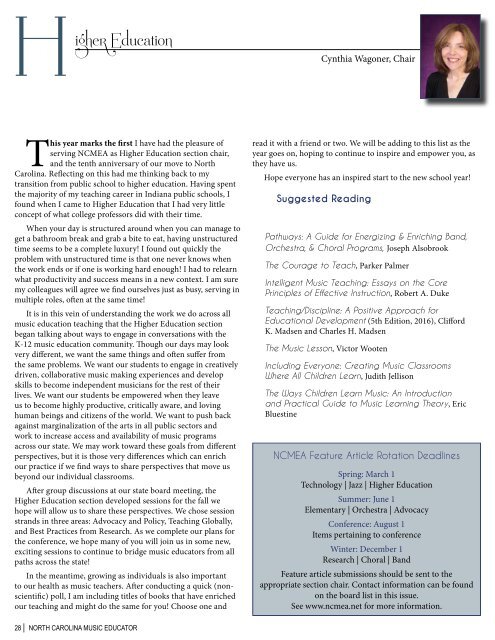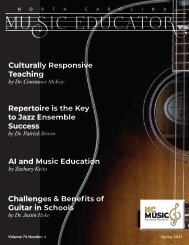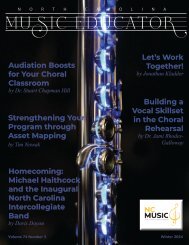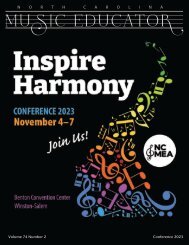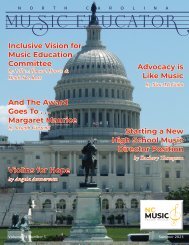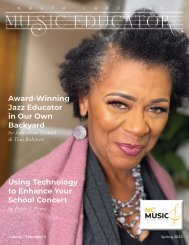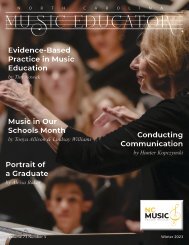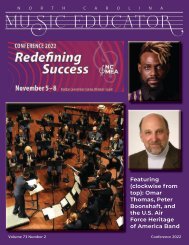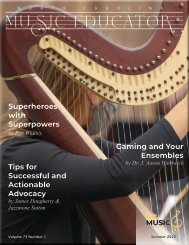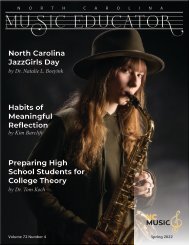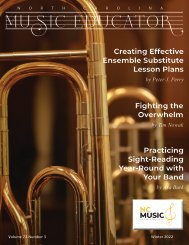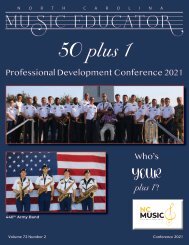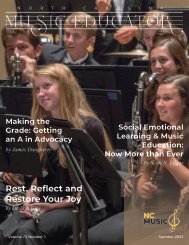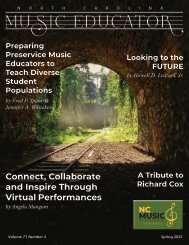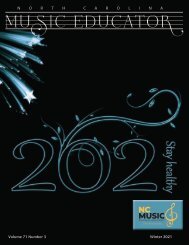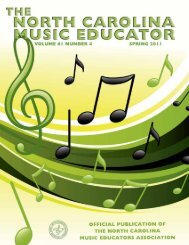NC Music Educator Summer 2017
North Carolina Music Educators Association Journal Summer 2017
North Carolina Music Educators Association Journal Summer 2017
- No tags were found...
You also want an ePaper? Increase the reach of your titles
YUMPU automatically turns print PDFs into web optimized ePapers that Google loves.
H<br />
igher Education<br />
Cynthia Wagoner, Chair<br />
East Carolina University® School of <strong>Music</strong><br />
This year marks the first I have had the pleasure of<br />
serving <strong>NC</strong>MEA as Higher Education section chair,<br />
and the tenth anniversary of our move to North<br />
Carolina. Reflecting on this had me thinking back to my<br />
transition from public school to higher education. Having spent<br />
the majority of my teaching career in Indiana public schools, I<br />
found when I came to Higher Education that I had very little<br />
concept of what college professors did with their time.<br />
When your day is structured around when you can manage to<br />
get a bathroom break and grab a bite to eat, having unstructured<br />
time seems to be a complete luxury! I found out quickly the<br />
problem with unstructured time is that one never knows when<br />
the work ends or if one is working hard enough! I had to relearn<br />
what productivity and success means in a new context. I am sure<br />
my colleagues will agree we find ourselves just as busy, serving in<br />
multiple roles, often at the same time!<br />
It is in this vein of understanding the work we do across all<br />
music education teaching that the Higher Education section<br />
began talking about ways to engage in conversations with the<br />
K-12 music education community. Though our days may look<br />
very different, we want the same things and often suffer from<br />
the same problems. We want our students to engage in creatively<br />
driven, collaborative music making experiences and develop<br />
skills to become independent musicians for the rest of their<br />
lives. We want our students be empowered when they leave<br />
us to become highly productive, critically aware, and loving<br />
human beings and citizens of the world. We want to push back<br />
against marginalization of the arts in all public sectors and<br />
work to increase access and availability of music programs<br />
across our state. We may work toward these goals from different<br />
perspectives, but it is those very differences which can enrich<br />
our practice if we find ways to share perspectives that move us<br />
beyond our individual classrooms.<br />
After group discussions at our state board meeting, the<br />
Higher Education section developed sessions for the fall we<br />
hope will allow us to share these perspectives. We chose session<br />
strands in three areas: Advocacy and Policy, Teaching Globally,<br />
and Best Practices from Research. As we complete our plans for<br />
the conference, we hope many of you will join us in some new,<br />
exciting sessions to continue to bridge music educators from all<br />
paths across the state!<br />
In the meantime, growing as individuals is also important<br />
to our health as music teachers. After conducting a quick (nonscientific)<br />
poll, I am including titles of books that have enriched<br />
our teaching and might do the same for you! Choose one and<br />
read it with a friend or two. We will be adding to this list as the<br />
year goes on, hoping to continue to inspire and empower you, as<br />
they have us.<br />
Hope everyone has an inspired start to the new school year!<br />
Suggested Reading<br />
Pathways: A Guide for Energizing & Enriching Band,<br />
Orchestra, & Choral Programs, Joseph Alsobrook<br />
The Courage to Teach, Parker Palmer<br />
Intelligent <strong>Music</strong> Teaching: Essays on the Core<br />
Principles of Effective Instruction, Robert A. Duke<br />
Teaching/Discipline: A Positive Approach for<br />
Educational Development (5th Edition, 2016), Clifford<br />
K. Madsen and Charles H. Madsen<br />
The <strong>Music</strong> Lesson, Victor Wooten<br />
Including Everyone: Creating <strong>Music</strong> Classrooms<br />
Where All Children Learn, Judith Jellison<br />
The Ways Children Learn <strong>Music</strong>: An Introduction<br />
and Practical Guide to <strong>Music</strong> Learning Theory, Eric<br />
Bluestine<br />
<strong>NC</strong>MEA Feature Article Rotation Deadlines<br />
Spring: March 1<br />
Technology | Jazz | Higher Education<br />
<strong>Summer</strong>: June 1<br />
Elementary | Orchestra | Advocacy<br />
Conference: August 1<br />
Items pertaining to conference<br />
Winter: December 1<br />
Research | Choral | Band<br />
Feature article submissions should be sent to the<br />
appropriate section chair. Contact information can be found<br />
on the board list in this issue.<br />
See www.ncmea.net for more information.<br />
Earn a Master’s Degree in<br />
<strong>Music</strong> Education Online<br />
Established in 2004, East Carolina University’s online MM in music education is North<br />
Carolina’s oldest established comprehensive online music education curriculum.<br />
Master of music distance education classes are taught by the same excellent<br />
East Carolina University School of <strong>Music</strong> faculty that teach campus-based students.<br />
Dr. Michelle Hairston<br />
Chair, <strong>Music</strong> Education<br />
Dr. Gregory Hurley Dr. Jay Juchniewicz Dr. Raychl Smith Dr. Cynthia Wagoner Dr. Andrea VanDeusen<br />
For more information, contact Dr. Rachel Copeland, Coordinator of Graduate Studies,<br />
at skibar@ecu.edu or 252-328-6342, or visit ecu.edu/music.<br />
28 | NORTH CAROLINA MUSIC EDUCATOR NORTH CAROLINA MUSIC EDUCATOR C.S. 17-1434 | 29


